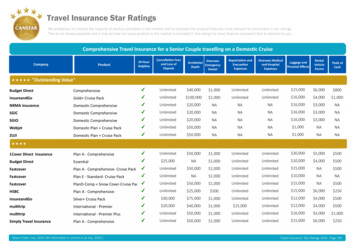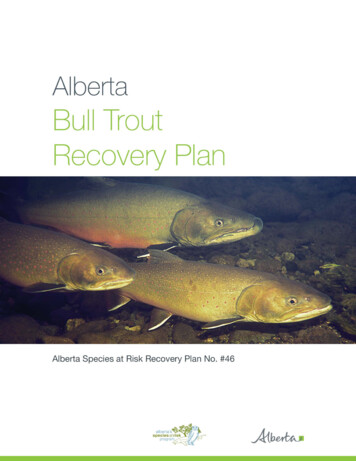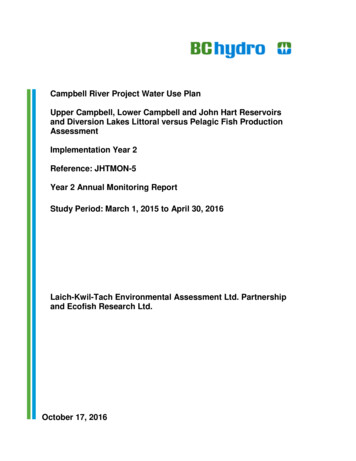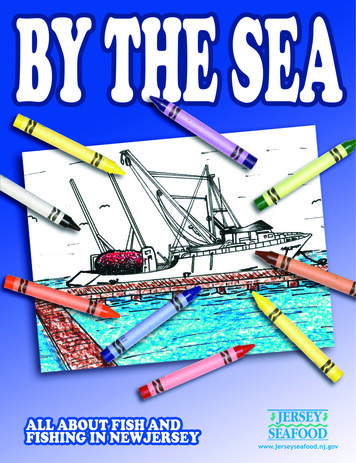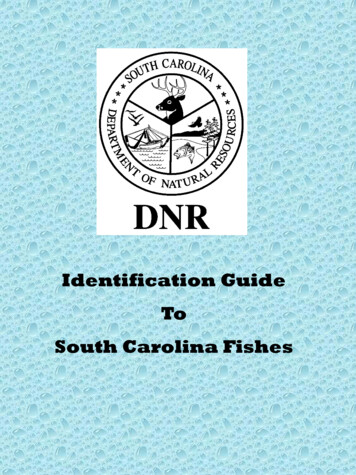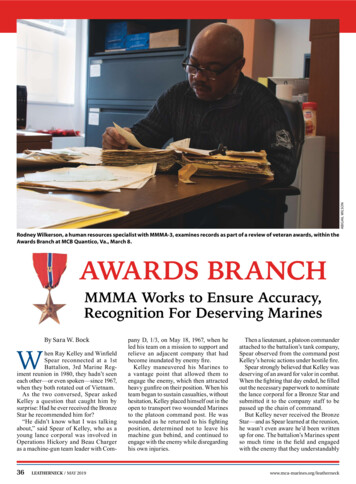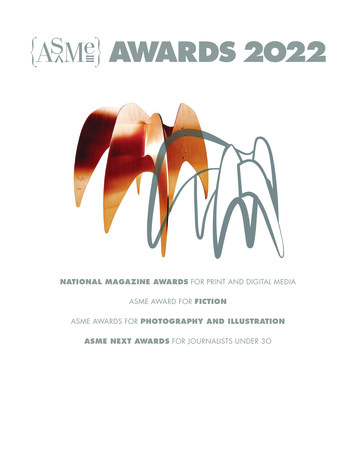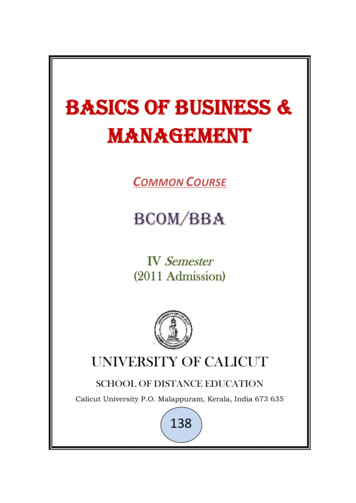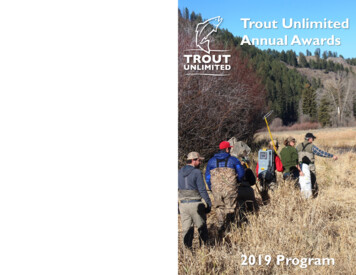
Transcription
Trout UnlimitedAnnual AwardsIF YOU TAKE CARE OF THE FISH,THE FISHING TAKES CARE OF ITSELFNominate Your Local VolunteersWWW.TU.ORG/AWARDS2019 Program
THANK YOU FOR BEING A TU VOLUNTEER!Trout Unlimited’s 4,000plus passionate and dedicated volunteer leaderswho drive our more than420 chapters and councilsare the heart of our organization's strength and themajor drivers of the impact we make togetherimproving our rivers andwatersheds.Thanks to all of you, andthe local level work thateach of you do every day,TU is one of the mosteffective coldwater conservation organizations acrossthe country and a model ofhow effective, local grassroots action and advocacy can change theworld.Last year, our chapters and councils recorded an astounding 737,000hours of volunteer service.Together, you planted a better future and restored rivers with over1,038 conservation projects, ignited a spark in the next generation withmore than 1,595 youth education programs and raised more than 10.3 million for your local programs and services.Thank you for making TU the powerful, grassroots organization that itis. We would not be able to accomplish all that we do without you.Please consider nominating someone in your chapter or council, or acommunity or agency partner, for a TU award in the future.To make a nomination for 2020, please visit www.tu.org/awards.COMMUNICATIONS PROFESSIONALEMILY & DAVE WHITLOCK (OK)Emily and Dave Whitlock have made their life’s work around fly fishing and sharing a love for thefish, rivers and resources needed to protect them.It would be impossible to count the thousands of anglers and conservationistswho have been inspired and moved to action by the art, writing and advocacyof Dave and Emily Whitlock who continue to eagerly share their passion forfishing and conservation with the world.A research chemist who retired more than 40 years ago to pursue a career infly fishing, art, fly tying and more, Dave is a prolific writer whose articles haveappeared in countless issues of Fly Fisherman Magazine, Fly Fishing and TyingJournal, Trout Magazine and others, as well as five books on the topics ofaquatic insects, fly tying and fly fishing.His impact on conservation is most notably seen in the Whitlock-Vibert BoxSystem, a unique and efficient in-stream salmonid egg incubator and nurserydevise. He worked for seven years researching and developing this systemwhich is used throughout the world for introduction or enhancement of wildtrout, char and salmon.Along with Emily, who has degrees in biology and botany, the two continue tolead fly fishing instruction programs from their home in Oklahoma.
DISTINGUISHED SERVICE: VETERANS SERVICESLYNN MARILLA (NC)North Carolina is home tomore than two dozenunique Veterans ServicePartnership programs,connecting with militaryveterans and their familymembers through a rangeof partners and efforts.Much of the success andgrowth of this programcan be attributed to LynnMarilla, Veterans ServicePartnership Coordinatorfor the state council, anactive volunteer with herlocal 032 - Hickory NorthCarolina Chapter, andfounder and executivedirector of Eagle RockCamp, a retreat designedespecially for militaryfamilies.TU NATIONAL CONSERVATION AWARDSSince the early 1960s, Trout Unlimited has bestowed awards to publiclyrecognize the outstanding achievements of its members, chapters andcouncils that have embodied the values of TU and fulfilled its mission toconserve, protect and restore North America's coldwater fisheries and theirwatersheds. TU also recognizes the contributions and accomplishments ofindividuals and groups outside the organization that have demonstratedsignificant leadership and success in the world of coldwater conservation.Today, TU is proud to showcase an exceptional group of achievements bythese award winners who represent grassroots conservation successes,professional commitment to conservation excellence and organizationalstrength within our chapters and councils.Congratulations 2019 Trout Unlimited National Award recipients.Chapter AwardsGold Trout Award: 436 — Upper Chattahoochee Chapter (GA)Silver Trout Award: 056 — WestSlope Chapter (MT)Volunteer AwardsLynn Marilla’s passion is to help military veterans - and theirfamilies—heal and reconnect through fly fishing retreats.Exposure to the outdoorshelps veterans recover from the stress and seen and unseen wounds of war.Working through the act of fly tying, casting and other aspects of the sporthelps redevelop fine motor skills and concentration. Connecting these veterans to a community like TU where they can continue to serve and find andforge friendships makes this effort sustainable and long-lasting.Lynn and her volunteers teach essential life skills to empower military families,help them find new purpose here at home, and to connect them to people intheir communities in meaningful ways.With her efforts and drive, the Veterans Service Partnership programs aregrowing throughout the state, and helping countless veterans in the process.Distinguished Service Leadership: Scott Hood (OK)Distinguished Service Leadership: Norma & Don Haynes (MD)Distinguished Service Conservation: Robb Smith (MI)Distinguished Service Youth Education: Andrew Dang (NJ)Distinguished Service Veteran Services: Lynn Marilla (NC)Distinguished Service Communications: North Carolina CouncilPartner AwardsJack Williams Award for Applied Conservation Science:Jeff Kershner, U.S. Geological Service (MT)Conservation Professional: Urban Eberhart, Kittitas Reclamation District (WA)Communications Professional: Emily & Dave Whitlock (OK)Corporate Conservation Partner: Kinross Gold
CORPORATE CONSERVATION PARTNERKINROSS GOLDDISTINGUISHED SERVICE: COMMUNICATIONSIn memory of Jean BollingerNORTH CAROLINA COUNCILThe Drift, The Mend, a new website, and an entirely new approach to statewide communications,have magnified the impact of the North Carolina Council’s efforts across the state.With support from Kinross, Trout Unlimited is working to re-open over 25 miles of fish passage onDry Creek in Nevada - waters that were blocked during mining road development in the 1960s.Kinross Gold puts their environmental policy into practice by partnering withTrout Unlimited on several ambitious conservation initiatives. These acts, andothers, make them a leader in responsible mining in North America.While many companies focus on the bottom line exclusively, Kinross madeone of the largest and most ecologically significant water rights donations inhistory when they signed an agreement with TU, resulting in three billiongallons of water per year remaining instream in critical tributaries ofMontana’s Yellowstone River.Their support of Trout Unlimited’s work to pass Good Samaritan legislation, apolicy needed to facilitate a public/private partnership in cleaning up the tensof thousands of abandoned mines polluting America’s rivers and streams,included a trip to Capitol Hill by their President & CEO, Paul Rollinson, an avidoutdoorsman, who joined TU in lending a voice of support to the effort.Along with supporting policy and restoration efforts, Kinross also supportsour youth education work, including sponsoring the Youth Fly Fishing Camp inNevada and involving their employees and children in the program.They are truly a partner in every sense of the word.A slick, polished, web-based magazine, called The Drift, that reaches nearly5,000 members quarterly, a more frequent email newsletter, called The Mend,that is eagerly opened when it hits inboxes, and a powerfully designed newwebsite and social media presence are what’s quickly noticed when you take alook at the North Carolina Council communications.Dig a little deeper, however, and you’ll find logos that speak to purpose andplace, graphics meant to tie all the chapters and councils in North Carolina together, and messaging that makes it clear that there is a cohesive and powerfulforce for coldwater conservation in the state.Filled with rich content from conservation news, to chapter activities, TU staffupdates, and news from the many great partnerships the council manages,these publications make every member in North Carolina feel proud of thegreat work they are supporting.Driven by a strong and collaborative council leadership, and shepherded by thehusband-and-wife communications duo of Charles and Suzanne Crolley, thecommunications efforts of the North Carolina Council don’t just hit it out of thepark in one arena, they make an impact in every media imaginable.To turn the pages of their magazine, scroll through the e-mails, or click awayon the website is to open a window into a thriving and vibrant TU communitythat is restoring rivers, educating youth, supporting veterans, building a betterfuture for cold, clean fishable water, and making sure everyone knows it!
DISTINGUISHED SERVICE: YOUTH EDUCATIONANDREW DANG (NJ)GOLD TROUT AWARD436 — UPPER CHATTAHOOCHEE CHAPTER (GA)Like many chapters, the UpperChattahoochee Chapter inGeorgia does amazing workpartnering on stream restoration projects. Their long-termproject with the US ForestService on Wilkes Branch,doing improvements such aslarge woody debris additions,is a perfect example of thison-the-ground conservation.Andrew Dang has turned his love for fishing into a lifelong passion for engaging more youth inTrout Unlimited’s conservation mission.Andrew Dang first popped up on the national radar in 2015 at the TU TeenSummit when he was just heading into ninth grade. By that time, however,this young man and passionate angler and conservationist was already deeplyengaged in his local 123 - Central New Jersey Chapter and finding ways tobring his skills and perspective to TU.No one in his family fished, but after watching anglers fly fish in a local park,he wanted to try, and quickly fell in love with the sport and the fish he chased.Having attended five years of Teen Summits, Andrew leads by example and isone of the most active contributing members of the Youth Leadership Council,made up of a handful of the most passionate and committed teen volunteersnationwide.He has produced three videos, multiple newsletters, developed social mediacampaigns to engage more youth in TU’s mission, and continues to be active inhis local chapter and on the New Jersey Council. He has also been asked to joinour national Headwaters Advisory Board and bring his experience to bear aswe plan for the growth and improvement of our youth education work.Andrew has already made such a big impact at TU, and we can’t wait to seewhat the next chapter brings!Strong veterans service programs, effective fundraising,and intentional leadershipdevelopment also make thechapter thrive.But what truly makes thesevolunteers who are “StraightOut of the Hooch” stand out istheir progressive mindset andinnovative approach to takeour conservation mission tonew audiences and levels.How do you engage thousands of families and river-loversto make the streams that flow through their communitiescleaner? Launch a unique and innovative social media campaign, and then share it with the rest of TU.A long-time partner of “Sweep the Hooch,” a cleanup event that covers 100miles, recruits nearly 1,200 volunteer and hauls over 40,000 pounds of garbage from the river, the chapter could have rested on the laurels of an amazing event. But they didn’t.To reach new rivers and connect with new people, they launched an Instagramcontest using the hashtag #CLEANMYWATER. This effort engages communitiesby challenging people to pickup garbage while out fishing or on the river. Theidea went viral and the chapter saw their Facebook following climb to 1,264and their Instagram audience climb to 1,569.In 2019, they exported the idea to the entire region, helping chapters acrossthe Southeast benefit from their new approach to connecting people to aneasy way to make a difference for clean water.
SILVER TROUT AWARD056 — WESTSLOPE CHAPTER (MT)JACK WILLIAMS AWARDFOR APPLIED CONSERVATION SCIENCEDR. JEFF KERSHNER — U.S. GEOLOGICAL SURVEYThe WestSlope Chapter challenged all chapters in the state to tie flies donated to the Warriors andQuiet Waters program. This past year, they donated 17,944 flies, bringing the total to over 32,000.Not every chapter is blessed to be located in Missoula, Mont., but even withthe incredible resources at its doorstep, it is what the WestSlope Chapter doeswith that good fortune that is truly astounding.The chapter models collaboration and support across all levels of TU throughits conservation funding. In just the past year, the chapter has contributed 133,750 to local conservation projects, including critical funding for the workof a staff project manager for Rock Creek, helping provide the “seed money”for the position that will improve the entire watershed.At the community level, monthly meetings have been taken to new levels,drawing an average 100-125 people. This success is partly driven by powerfulspeakers and topics, but magnified by an investment in communications thatinclude mailed postcards, follow-up phone calls, and outreach that goes farbeyond the chapter’s membership roster.Dr. Jeff Kershner followed his heart into conservation, a path which led him from one incredibleopportunity to another, all dedicated to preserving our rivers and streams.A researcher, scientist and author, at his heart Dr. Jeff Kershner is a lover oftrout—and the wild places they inhabit.During his working hours, he has sampled fish populations, measured the impacts of climate change, knocked down small dams, proven the impact of bigdams, developed the research needed for large scale policy changes, andwritten extensively on the plight of native salmonids. In his off hours, he hasspent the past several decades chasing trout and salmon across the PacificNorthwest and the Rocky Mountains, taking special pleasure in targeting native fish in their natal streams.WestSlope’s Women’s Initiative has exploded, with a staggering 13 events inMay to August — most of those with a wait list — and a growing “MissoulaFlygals” with more than 100 women actively engaged.While Dr. Kershner closed out his career with the U.S. Geological Survey asDirector of its Northern Rocky Mountain Science Center, his stints with theCalifornia Department of Fish and Game, the U.S. Forest Service and variousuniversities helped him develop a network and deep set of friendships withcolleagues from Trout Unlimited and a wide range of agencies.The chapter is growing fast, and sharing its learning along the way with fellowchapters in Montana, and across the country.His most recent project, a collaboration with TU’s former Senior Scientist JackWilliams, is the publication of a new book Trout and Char of the World.
CONSERVATION PROFESSIONALURBAN EBERHART—KITTITAS RECLAMATION DISTRICTDISTINGUISHED SERVICE: LEADERSHIPIn memory of Stan GriffithSCOTT HOOD (OK)Give Scott Hood aflyrod and a greenwoolly bugger —which he refers to asTFTCE (The Fly ThatCatches Everything) —and he’ll find a way tocatch trout, carp,catfish and more on hisbeloved Lower IllinoisRiver, where he is anardent champion andadvocate.Urban Eberhart on a tour of one of the Yakima Basin Integrated Plan’s first projects, whichincreased water conservation on the Kittitas Reclamation District and allowed the district to pumpwater backward into Manastash Creek to keep water flowing for fish during a drought.Photo: TJ Mullinax / Good Fruit GrowerUrban Eberhart’s impact on fish, farms and towns in the Yakima River Basincannot be overstated. He is a farmer, an irrigation district manager and one ofthe Yakima Basin’s best advocates.A driving force behind the Yakima River Basin Water Enhancement Project,Urban helped create a diverse and effective coalition, including Trout Unlimited, that worked for years to pass the Yakima Basin legislation, as part of theJohn Dingell Conservation Act, into law.Urban’s home in Kittitas County in the Yakima Basin is a leading producer ofhay, fruit trees and wines. The key to the Basin’s agricultural production is itswater that comes from winter snowpack in the eastern Cascade Mountains.However, the same water that supports a multi-billion-dollar agricultural economy also once supported the second largest salmon runs in the Columbia Basin. The Yakima Basin Integrated Plan provides water security and certainty tosustain the farms, families, and fish towns throughout the basin, and throughseemingly endless travel and promotion, Urban is helping find new ways toconserve water, protect farmers, and restore streams for fish and wildlife.Give him a pen andsome paper, and he’llfire off 100 letters topartner organizations,state legislators, andmembers of Congressto ensure that sameScott Hood is enthusiastic about all fish as every fish caught provesriver is protected.his local river is on the path to protection and recovery. That enthusi-asm is carried over into his national-level leadership for TU.Give him an urbanpond and some stocked trout, and he’ll create a day of lasting memories for anentire new generation of anglers and their families. Scott is a leader both locally and nationally for building community for youth and veterans within TU.Whatever tool you put in Scott Hood’s hand, he will quickly turn that into aresource for TU to grow membership, motivate leadership, drive regulatorychange, and more.From his first days as a volunteer with the 420 - Oklahoma Chapter through hisleadership with his Council, to his service on the National Leadership Council,TU’s Headwaters Youth Education Board, and as a national Board of Trusteesmember, Scott has dedicated so much of his life — and his family’s support —to ensuring that TU continues to grow and make a difference across the country.
DISTINGUISHED SERVICE: LEADERSHIPIn memory of Stan GriffithNORMA & DON HAYNES (MD)DISTINGUISHED SERVICE: CONSERVATIONROBB SMITH (MI)Sharing a passion for conservation comes easy to Normaand Don Haynes, who havededicated decades of combined service to TU’s mission.From City Catch, a programthat connects Baltimore families to the importance ofkeeping local rivers clean, tothe launch and revitalizationof many local chapters, theyhave poured heart and talentinto TU as a couple.Steadfastly focused on ensuring the next generation ofleaders follow in their footsteps, the pair have helpedguide and mentor countlessnew volunteers and helpedrecruit young and passionate Norma & Don Haynes exemplary leadership has had signifimembers into the leadership cant impacts on advancing the effectiveness of chapters andcouncils nationwide.ranks.As a chapter president, Norma has driven diversity and membership engagement home locally. As a council chair, and now a member of the NationalLeadership Council, Don has used TU’s online Leaders Forum as a way tospread ideas, foster creativity and connect and support TU volunteers welloutside his immediate geographic reach.Whether you know it or not, your own chapter has likely benefitted from anidea fostered in Norma’s chapter or a resource designed or shared by Don inthe Tacklebox or Community Forum. Thanks to Norma and Don, TU is thrivingin the Mid-Atlantic, and their model of investing in the future leadership is being spread far and wide.Robb Smith of Michigan chairs the Great Lakes Workgroup for the National Leadership Council,and has led the development of “A Case for the Great Lakes,” a rallying cry and plan to protect andrestore the watersheds that feed into the largest body of fresh water on earth.One-fifth of all the fresh surface water on the planet can be found in the GreatLakes, which receive water drainages from Michigan, Wisconsin, Minnesota,Illinois, Indiana, Ohio, Pennsylvania and New York.This immense natural resource, home to everything from native brook troutand grayling, to wild reproducing salmon, steelhead, trout and more, deservesTU’s focused effort, and Robb Smith is making sure that happens.As chair of the Great Lakes Workgroup of the National Leadership Council,Robb has been an irrepressible advocate for doing more to protect the lakesfrom invasive species, water pollution, micro-plastics, mining, fish-farming andmore. He has immersed himself in learning the issues and impacts of all thethreats, worked with TU staff and state councils to develop shared goals andactions that must be taken, and has taken that effort on the road to build support among chapters, councils, staff and partners across the region.While all conservation is local, Robb has proven that one person can make adifference, even if their “backyard” watershed is more than 95,000 acres!
DISTINGUISHED SERVICE: LEADERSHIPIn memory of Stan GriffithNORMA & DON HAYNES (MD)DISTINGUISHED SERVICE: CONSERVATIONROBB SMITH (MI)Sharing a passion for conservation comes easy to Normaand Don Haynes, who havededicated decades of combined service to TU’s mission.From City Catch, a programthat connects Baltimore families to the importance ofkeeping local rivers clean, tothe launch and revitalizationof many local chapters, theyhave poured heart and talentinto TU as a couple.Steadfastly focused on ensuring the next generation ofleaders follow in their footsteps, the pair have helpedguide and mentor countlessnew volunteers and helpedrecruit young and passionate Norma & Don Haynes exemplary leadership has had signifimembers into the leadership cant impacts on advancing the effectiveness of chapters andcouncils nationwide.ranks.As a chapter president, Norma has driven diversity and membership engagement home locally. As a council chair, and now a member of the NationalLeadership Council, Don has used TU’s online Leaders Forum as a way tospread ideas, foster creativity and connect and support TU volunteers welloutside his immediate geographic reach.Whether you know it or not, your own chapter has likely benefitted from anidea fostered in Norma’s chapter or a resource designed or shared by Don inthe Tacklebox or Community Forum. Thanks to Norma and Don, TU is thrivingin the Mid-Atlantic, and their model of investing in the future leadership is being spread far and wide.Robb Smith of Michigan chairs the Great Lakes Workgroup for the National Leadership Council,and has led the development of “A Case for the Great Lakes,” a rallying cry and plan to protect andrestore the watersheds that feed into the largest body of fresh water on earth.One-fifth of all the fresh surface water on the planet can be found in the GreatLakes, which receive water drainages from Michigan, Wisconsin, Minnesota,Illinois, Indiana, Ohio, Pennsylvania and New York.This immense natural resource, home to everything from native brook troutand grayling, to wild reproducing salmon, steelhead, trout and more, deservesTU’s focused effort, and Robb Smith is making sure that happens.As chair of the Great Lakes Workgroup of the National Leadership Council,Robb has been an irrepressible advocate for doing more to protect the lakesfrom invasive species, water pollution, micro-plastics, mining, fish-farming andmore. He has immersed himself in learning the issues and impacts of all thethreats, worked with TU staff and state councils to develop shared goals andactions that must be taken, and has taken that effort on the road to build support among chapters, councils, staff and partners across the region.While all conservation is local, Robb has proven that one person can make adifference, even if their “backyard” watershed is more than 95,000 acres!
CONSERVATION PROFESSIONALURBAN EBERHART—KITTITAS RECLAMATION DISTRICTDISTINGUISHED SERVICE: LEADERSHIPIn memory of Stan GriffithSCOTT HOOD (OK)Give Scott Hood aflyrod and a greenwoolly bugger —which he refers to asTFTCE (The Fly ThatCatches Everything) —and he’ll find a way tocatch trout, carp,catfish and more on hisbeloved Lower IllinoisRiver, where he is anardent champion andadvocate.Urban Eberhart on a tour of one of the Yakima Basin Integrated Plan’s first projects, whichincreased water conservation on the Kittitas Reclamation District and allowed the district to pumpwater backward into Manastash Creek to keep water flowing for fish during a drought.Photo: TJ Mullinax / Good Fruit GrowerUrban Eberhart’s impact on fish, farms and towns in the Yakima River Basincannot be overstated. He is a farmer, an irrigation district manager and one ofthe Yakima Basin’s best advocates.A driving force behind the Yakima River Basin Water Enhancement Project,Urban helped create a diverse and effective coalition, including Trout Unlimited, that worked for years to pass the Yakima Basin legislation, as part of theJohn Dingell Conservation Act, into law.Urban’s home in Kittitas County in the Yakima Basin is a leading producer ofhay, fruit trees and wines. The key to the Basin’s agricultural production is itswater that comes from winter snowpack in the eastern Cascade Mountains.However, the same water that supports a multi-billion-dollar agricultural economy also once supported the second largest salmon runs in the Columbia Basin. The Yakima Basin Integrated Plan provides water security and certainty tosustain the farms, families, and fish towns throughout the basin, and throughseemingly endless travel and promotion, Urban is helping find new ways toconserve water, protect farmers, and restore streams for fish and wildlife.Give him a pen andsome paper, and he’llfire off 100 letters topartner organizations,state legislators, andmembers of Congressto ensure that sameScott Hood is enthusiastic about all fish as every fish caught provesriver is protected.his local river is on the path to protection and recovery. That enthusi-asm is carried over into his national-level leadership for TU.Give him an urbanpond and some stocked trout, and he’ll create a day of lasting memories for anentire new generation of anglers and their families. Scott is a leader both locally and nationally for building community for youth and veterans within TU.Whatever tool you put in Scott Hood’s hand, he will quickly turn that into aresource for TU to grow membership, motivate leadership, drive regulatorychange, and more.From his first days as a volunteer with the 420 - Oklahoma Chapter through hisleadership with his Council, to his service on the National Leadership Council,TU’s Headwaters Youth Education Board, and as a national Board of Trusteesmember, Scott has dedicated so much of his life — and his family’s support —to ensuring that TU continues to grow and make a difference across the country.
SILVER TROUT AWARD056 — WESTSLOPE CHAPTER (MT)JACK WILLIAMS AWARDFOR APPLIED CONSERVATION SCIENCEDR. JEFF KERSHNER — U.S. GEOLOGICAL SURVEYThe WestSlope Chapter challenged all chapters in the state to tie flies donated to the Warriors andQuiet Waters program. This past year, they donated 17,944 flies, bringing the total to over 32,000.Not every chapter is blessed to be located in Missoula, Mont., but even withthe incredible resources at its doorstep, it is what the WestSlope Chapter doeswith that good fortune that is truly astounding.The chapter models collaboration and support across all levels of TU throughits conservation funding. In just the past year, the chapter has contributed 133,750 to local conservation projects, including critical funding for the workof a staff project manager for Rock Creek, helping provide the “seed money”for the position that will improve the entire watershed.At the community level, monthly meetings have been taken to new levels,drawing an average 100-125 people. This success is partly driven by powerfulspeakers and topics, but magnified by an investment in communications thatinclude mailed postcards, follow-up phone calls, and outreach that goes farbeyond the chapter’s membership roster.Dr. Jeff Kershner followed his heart into conservation, a path which led him from one incredibleopportunity to another, all dedicated to preserving our rivers and streams.A researcher, scientist and author, at his heart Dr. Jeff Kershner is a lover oftrout—and the wild places they inhabit.During his working hours, he has sampled fish populations, measured the impacts of climate change, knocked down small dams, proven the impact of bigdams, developed the research needed for large scale policy changes, andwritten extensively on the plight of native salmonids. In his off hours, he hasspent the past several decades chasing trout and salmon across the PacificNorthwest and the Rocky Mountains, taking special pleasure in targeting native fish in their natal streams.WestSlope’s Women’s Initiative has exploded, with a staggering 13 events inMay to August — most of those with a wait list — and a growing “MissoulaFlygals” with more than 100 women actively engaged.While Dr. Kershner closed out his career with the U.S. Geological Survey asDirector of its Northern Rocky Mountain Science Center, his stints with theCalifornia Department of Fish and Game, the U.S. Forest Service and variousuniversities helped him develop a network and deep set of friendships withcolleagues from Trout Unlimited and a wide range of agencies.The chapter is growing fast, and sharing its learning along the way with fellowchapters in Montana, and across the country.His most recent project, a collaboration with TU’s former Senior Scientist JackWilliams, is the publication of a new book Trout and Char of the World.
DISTINGUISHED SERVICE: YOUTH EDUCATIONANDREW DANG (NJ)GOLD TROUT AWARD436 — UPPER CHATTAHOOCHEE CHAPTER (GA)Like many chapters, the UpperChattahoochee Chapter inGeorgia does amazing workpartnering on stream restoration projects. Their long-termproject with the US ForestService on Wilkes Branch,doing improvements such aslarge woody debris additions,is a perfect example of thison-the-ground conservation.Andrew Dang has turned his love for fishing into a lifelong passion for engaging more youth inTrout Unlimited’s conservation mission.Andrew Dang first popped up on the national radar in 2015 at the TU TeenSummit when he was just heading into ninth grade. By that time, however,this young man and passionate an
Andrew Dang has turned his love for fishing into a lifelong passion for engaging more youth in Trout Unlimited’s conservation mission. GOLD TROUT AWARD 436 —UPPER CHATTAHOOCHEE CHAPTER (GA) Like many chapters, the Upper hattahoochee hapter in Georgia does amazing work pa
